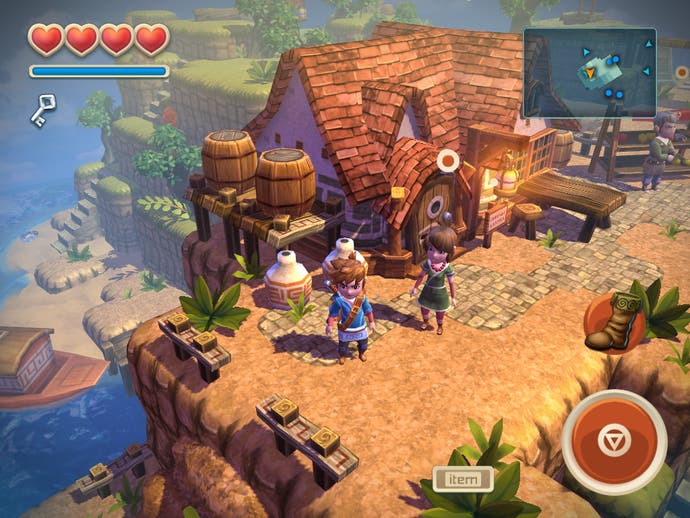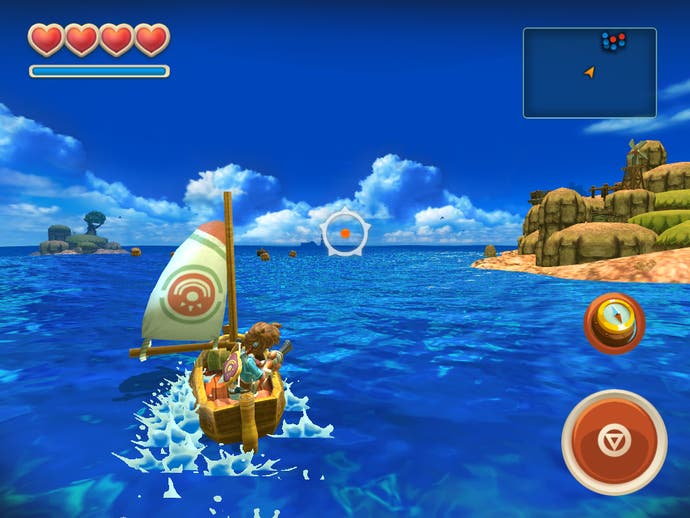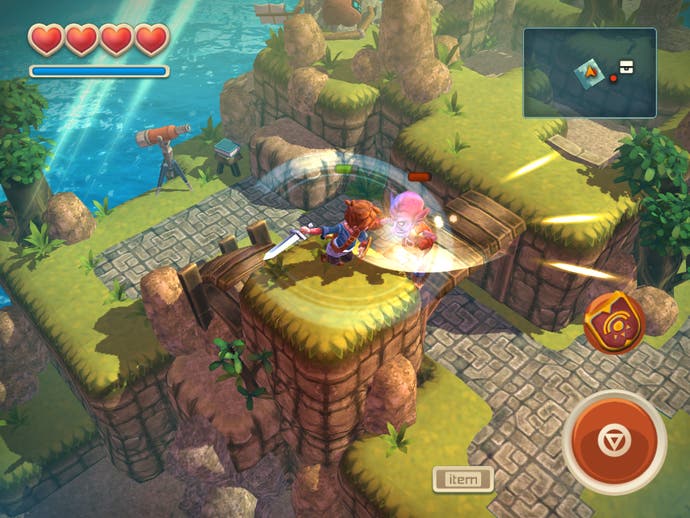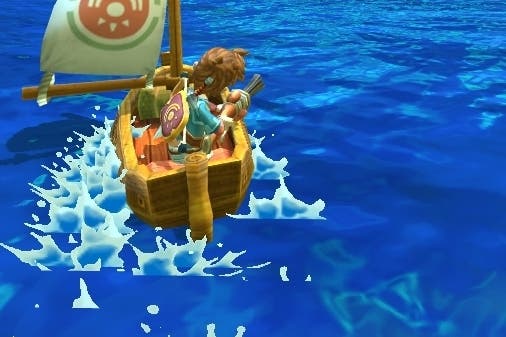Oceanhorn: Monster of the Uncharted Seas review
Missing Link?
There's a thin line between copycat and tribute, and it's a line that ambitious iPad adventure Oceanhorn walks with varying degrees of success. This is a game that wears its influences so brazenly that it's barely worth even naming names. It might as well be walking through the smoky doors on Stars In Your Eyes and declaring, "Tonight Matthew, I'm going to be The Legend of Zelda."
There are worse games to aim for, of course, but in taking aim at such a beloved classic - and one that has only just released yet another superb sequel - Oceanhorn leaves itself with a mountain that's impossible to climb. This is as indie as it gets, a game from Cornfox & Bros, a tiny Finnish studio trying to recreate the wonder of a nearly 30-year-old series, developed by some of the best designers in history and published by one of the biggest publishers in the world. It's not just that Oceanhorn wants to be a game in the Zelda style; it too often wants to be an actual Zelda game.
Inevitably, it doesn't succeed, but it's not for want of trying. Oceanhorn is one of those games that gets by on a combination of plucky ambition and accumulated goodwill, rather than more tangible gameplay strengths.

You're playing as the obligatory tousle-haired young boy, crossing the threshold into adulthood via a quest that ties into your inherited destiny. Your father set out to face down the titular sea creature and never returned. Now it's your turn to save the world from the beast.
"Oceanhorn can't help but stand out in a medium still too mired in dour greys and browns."
It's a journey that is never less than visually delightful, thanks to a crisp and colourful aesthetic that draws on the best features of Japanese design. There's a fine balance here between the chunky stylings of the 16 and 32-bit eras and the bold detail of today's HD Retina display. From Sega blue skies to Nintendo green trees, Oceanhorn can't help but stand out in a medium still too mired in dour greys and browns.
You strike out on your adventure in typical timid style, warming up by battering a few easy enemies with a stick before claiming your sword and shield. Navigation around the game's isometric world is handled by a slightly flaky virtual joystick method that bleeds over into a more precise 'tap where you want to go' system. Neither is particularly ideal for precision movement. Combat, meanwhile, is a question of tapping a big 'action' button to swing your sword, while your equipped item - your shield, to begin with - is handled by a smaller button just above it.
It's a workable system, but not an elegant one. The game looks gorgeous in screenshots, but is a little clumsy in motion. Guiding our hero around some of the game's tortuously narrow paths without tumbling off is a problem, while fights against the later enemies are made fiddly when the action button decides you want to pick up a nearby barrel rather than swing your weapon.

Structurally, the game hews predictably close to the Zelda template, with more than a dash of Metroid. You'll scoot between the game's distinctive island areas in a Wind Waker-style boat, entering self-contained dungeons in search of the objects needed to access the other islands, which then lead to more dungeons, and so on. Your first order of business, for example, is to head to Bomb Island to unlock the explosives needed to get past rockfalls on another island. It's a simple rhythm but an effective one, and with completion taking anywhere up to 20 hours, you're certainly getting your money's worth for the £5.99 asking price.
It's just a pity that the moment-by-moment gameplay, while enjoyable, never really builds up much steam. Puzzles are almost entirely centred on that old standby of pushing blocks onto pressure plates or to plug gaps in walkways, and the dungeon designs rarely deviate from the expected layout of a linear main pathway with occasional side rooms containing extra coins or other goodies. For a game with such an alluring look, it's used to create a disappointingly flat world.
Away from the forward thrust of the story, there are some solid ideas pushing things along. There's a nice challenge system that adds an additional layer of reward to each island, nudging you towards a handful of secrets or just encouraging more thorough exploration. Levelling up is a straightforward affair - once your XP hits the ceiling, your stats creep upwards and you may gain a new ability.

The way the world fills out is similarly basic but effective. As you explore and talk to characters, or read the lore scattered throughout the world, you'll add new locations to the map. There's nothing to stop you investigating each new island as it appears and, soon enough, you're spoilt for choice as to where to go next - a fact that can lead to a lot of sailing backwards and forwards in the early going.
It's hard not to be won over by Oceanhorn's wide-eyed retro passion and its appealingly upbeat visual style, then, but while there's a hell of lot here to like, there's not nearly enough to love. Part of that is due to the not-quite-there control and the less than inspiring long-term structure. Plenty of it is also down to the fact that it's puppy-dog eagerness to pay tribute to the Nintendo and Squaresoft of the 1990s that it never quite makes an impression of its own. It's easy to recommend, but only on the basis that so much of the praise headed its way comes with caveats. Everything it does is well done for a mobile indie game, and with few Zelda-like rivals on iOS it doesn't really have to excel to justify its existence.
Oceanhorn is good enough to suggest that Cornfox & Bros is a developer to watch, and one with an acute eye. A little more spit and polish on the mechanics, and the confidence to build a game around original ideas rather than sitting in the shadows of giants, and it could create a classic of its own. For now, this is a fine calling card.









